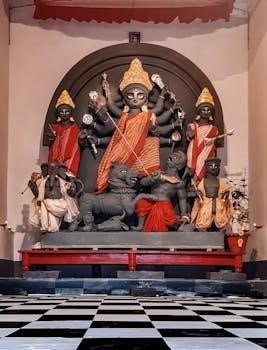The Durga Ashtothram in Telugu is a sacred hymn that beautifully connects devotees with Goddess Durga through her 108 divine names. It is a powerful devotional practice that invokes her blessings and grace, often available in PDF format.
Significance of Durga Ashtothram
The Durga Ashtothram holds immense significance for devotees seeking the blessings of Goddess Durga. This sacred hymn, comprising 108 names, is a powerful tool for connecting with the divine feminine energy. Each name within the Ashtothram represents a specific attribute or aspect of the Goddess, allowing devotees to meditate on her multifaceted nature. Chanting these names is believed to invoke her protective grace, strength, and courage. Regular recitation can foster spiritual growth, inner peace, and the removal of obstacles. The Durga Ashtothram is not merely a collection of names; it’s a pathway to understanding and experiencing the divine essence of Durga. Its recitation is a revered practice, often undertaken during festivals and auspicious occasions, as it is believed to bring prosperity, well-being, and victory over adversity. The hymn’s importance extends beyond personal benefit, serving as a reminder of the eternal battle between good and evil, and the triumph of righteousness, inspiring devotees to embody the virtues of the Goddess.
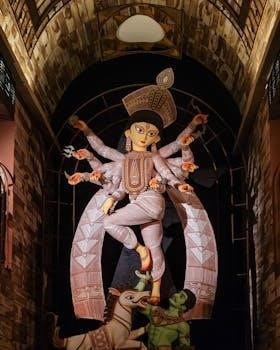
Understanding the Durga Ashtothram
The Durga Ashtothram is a sacred hymn consisting of 108 names of Goddess Durga. Each name embodies a unique quality and aspect, revealing her divine nature and significance.
Meaning and Purpose of the 108 Names
The 108 names of Goddess Durga, found within the Durga Ashtothram, are not mere labels but profound mantras, each carrying a deep spiritual significance. These names are carefully chosen to reflect various aspects of Durga’s divine personality, her powers, and her roles in the cosmos. They illuminate her as the ultimate protector, the destroyer of evil, and the embodiment of supreme feminine energy. Chanting each name is believed to invoke a specific quality of Durga, allowing devotees to connect with her on multiple levels. The purpose of reciting these names is to seek her blessings, guidance, and protection, as well as to purify the mind and elevate consciousness. Through this practice, devotees strive to realize their potential and overcome obstacles in life with the grace of the Goddess. It’s a journey of self-discovery and spiritual growth facilitated by the power inherent in the names of Durga, aiming to fill one with bravery, fearlessness, and devotion.
Devotional Practice and Benefits
Engaging with the Durga Ashtothram is a profound devotional practice that offers numerous benefits to its practitioners. The act of reciting the 108 names of Goddess Durga, especially from a Telugu PDF, can be a deeply meditative experience. Devotees often chant these names with focus and devotion, aiming to connect with the divine energy of Durga. The practice is known to foster inner peace, reduce stress, and cultivate a sense of spiritual well-being. Furthermore, it is believed that reciting the names can help overcome negative energies, remove obstacles, and attract positive forces into one’s life. Regular practice can lead to increased courage, strength, and a feeling of protection under the grace of the Goddess. The rhythmic chanting of these sacred names creates a powerful vibration that purifies the environment and uplifts the soul. It’s a path to self-improvement and spiritual enlightenment through sincere devotion.
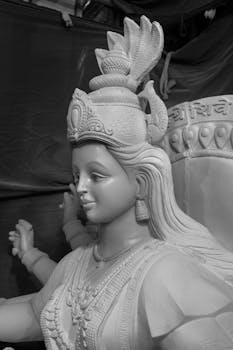
Durga Ashtothram PDF Resources
Numerous online platforms offer free downloads of the Durga Ashtothram in Telugu PDF. These resources provide devotees with convenient access to the sacred text for their daily prayers and practices.
Availability of Telugu PDF Downloads
The Durga Ashtothram, a cherished prayer consisting of 108 names of Goddess Durga, is readily available for download in Telugu PDF format across various online platforms. Devotees can easily access these digital versions, enabling them to carry the sacred text on their devices for convenient daily recitation. Numerous websites and spiritual portals offer these PDF resources, often for free, ensuring that the Ashtothram is accessible to all who seek to connect with the divine feminine. These downloads typically include the full text of the 108 names in Telugu script, facilitating accurate pronunciation and enhancing the spiritual experience. The ease of access to these PDFs has made it simpler for individuals to incorporate this powerful prayer into their regular devotional practices, regardless of their location or time constraints. This digital availability also helps preserve and propagate this ancient tradition.
Content of the PDF Document
The Durga Ashtothram PDF document in Telugu primarily contains the 108 sacred names of Goddess Durga, meticulously arranged for devotional recitation. Each name is a unique epithet, describing a particular aspect, attribute, or manifestation of the Goddess. The PDF usually presents the names in clear Telugu script, ensuring easy readability for native speakers. Alongside the names, some versions of the document may include transliterations in other scripts for better understanding. Additionally, the PDF might feature introductory verses, concluding prayers, or mantras associated with Goddess Durga. Occasionally, you might find the benefits of chanting the Ashtothram included. The structure of the document is typically straightforward, allowing devotees to follow the sequence of names in a smooth and uninterrupted manner. These documents are crafted to aid individuals in their spiritual practice, offering an accessible and convenient tool for daily worship and meditation.
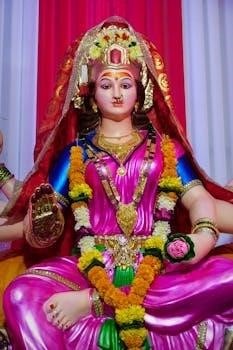
Related Rituals and Festivals
The recitation of Durga Ashtothram is often linked to festivals like Vijayadashami, celebrating Durga’s victory. Other rituals include Shami Puja and Aparajita Puja, all honoring the divine feminine.
Vijayadashami and Durga’s Victory
Vijayadashami marks a significant occasion celebrating the triumph of good over evil. This auspicious day commemorates two major victories⁚ Lord Rama’s defeat of the demon Ravana and Goddess Durga’s vanquishing of the buffalo demon, Mahishasura. These dual victories symbolize the power of righteousness and the destruction of negativity. The festival is observed with great enthusiasm, signifying the victory of Dharma over Adharma. The recitation of the Durga Ashtothram is particularly relevant during this time, as it invokes the divine power of Goddess Durga. Rituals like Shami Puja, Aparajita Puja, and Simollanghana are often performed on Vijayadashami, all aimed at honoring the divine and seeking blessings. The day serves as a reminder of the strength and courage needed to overcome challenges and uphold virtuous principles. The power of the goddess is often invoked through stotras like the Durga Ashtothram.
Other Relevant Rituals
Beyond Vijayadashami, several other rituals are associated with Goddess Durga and her worship, often interwoven with the recitation of the Durga Ashtothram. These rituals are performed during various festivals and occasions, demonstrating the widespread devotion to the goddess. During Navaratri, for instance, the nine forms of Durga are venerated, with daily prayers and offerings. The recitation of the Durga Ashtothram is an integral part of these celebrations. Additionally, many devotees observe weekly fasts dedicated to Durga, during which they chant her names and perform poojas. These rituals often involve specific mantras, offerings of flowers, and the lighting of lamps; The communal singing of bhajans and devotional songs also plays a significant role, creating a spiritually charged atmosphere. These practices are carried out to seek blessings, protection, and overall well-being, strengthening the bond between the devotee and the divine. The Durga Ashtothram serves as a powerful tool within these diverse rituals, enhancing their spiritual potency.
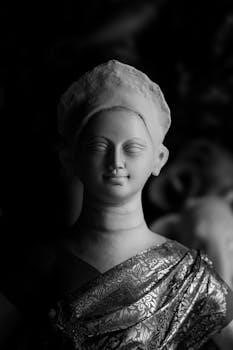
Additional Information
Besides the Durga Ashtothram, many other stotras and devotional materials are available for those seeking a deeper connection with the divine. These include various bhajans, aartis and shlokas.
Other Stotras and Devotional Material
Beyond the Durga Ashtothram, a wealth of other stotras and devotional materials can enrich one’s spiritual journey. These resources provide diverse avenues for connecting with the divine. Many devotees find solace and inspiration in various bhajans, aartis, and shlokas dedicated to different deities. These devotional songs and chants create an atmosphere of reverence and devotion. Exploring these additional materials can offer a broader understanding of Hindu spirituality and traditions. Texts such as the Sri Mahalakshmi stotram and other deity-specific hymns provide further insight into divine qualities. Also, resources like the Durga Chalisa and other shlokas enhance the devotional experience. Accessing these spiritual resources, often available in multiple languages including Telugu, can deepen one’s connection with the divine; These materials are often found in books and online, catering to a wide range of spiritual seekers.
Where to Find More Books
For those seeking a deeper understanding and a broader collection of devotional materials, several avenues exist to find more books. Local bookstores specializing in Indian religious texts often carry a variety of stotras, including the Durga Ashtothram, in Telugu and other languages. Additionally, online platforms dedicated to spiritual and cultural resources offer a wide selection of books and e-books. Websites like Greater Telugu and Vaidika Vignanam are good resources for spiritual literature. These platforms frequently provide access to both physical books and downloadable PDFs. Many websites offer books that cover a vast range of stotras, shlokas, and devotional texts catering to diverse spiritual needs. Furthermore, exploring libraries with collections of religious texts can also lead to finding valuable resources. These locations are ideal for those seeking to enrich their knowledge of Hindu scriptures and practices.
